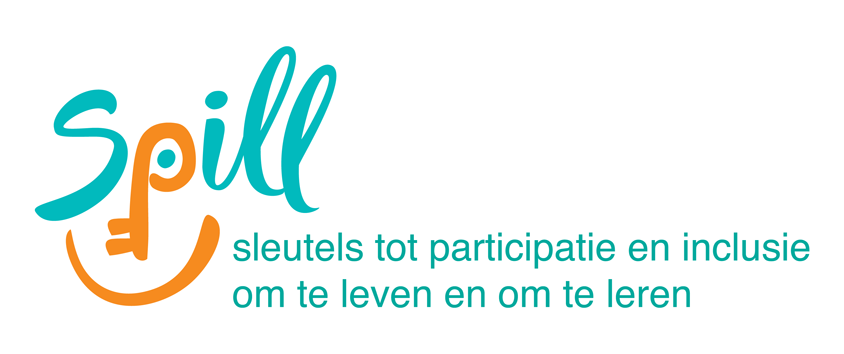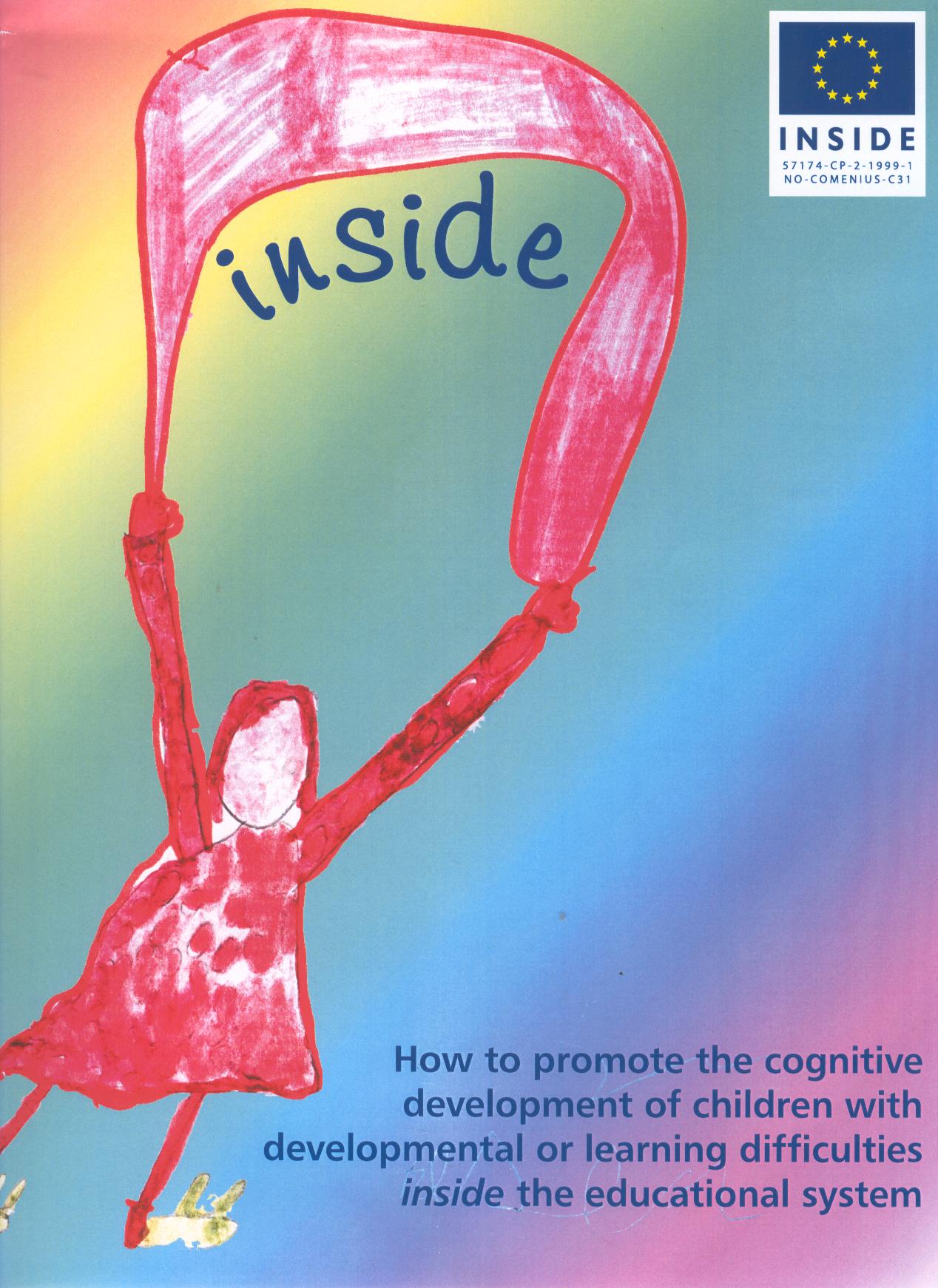 | The INSIDE project (INclusive education of children with developmental disabilities through basic Skill Instruction and Developmental Education) (1998-2000) was a Comenius project with four European countries (BE, NO, UK & RO) led by the Institute for Applied Pedagogy (now Pedverket) from Voss (NO). It brought together three approaches actively working towards inclusive education and learning enhancement: Feuerstein’s Mediated Learning Experience, Nyborg’s Concept Teaching Model, and Sue Buckley’s methods of teaching reading, writing and math in children with Down syndrome. International and national training courses and conferences were organised. |
Results – publications
 | INSIDE Teachers’ Guide: Lebeer J (Ed.) (2003), Project INSIDE. How to activate cognitive development of children with or at risk of developmental or learning problems inside the educational system? Southsea (UK): Down Syndrome Educational Trust Ltd 1 Learning to think together: activating cognitive learning skills and inclusion of children with a wide variation in development – Jo Lebeer 2 The art of cognitive bricklaying: Feuerstein’s Structural Cognitive Modifiability and Mediated Learning Experience – Jo Lebeer 3 Concept Teaching Model: Magne Nyborg’s pedagogical approach – Andreas Hansen, Morten Hem & Gunvar Sonnesy 4 Learning to read to teach talking and thinking – the Portsmouth approach of cognitive development and inclusion -Sue Buckley & Gillian Bird 5 Cognitive keys: activating cognitive functioning of children from an impoverished environment. – Maria Roth & Istvan Szamoskozi |

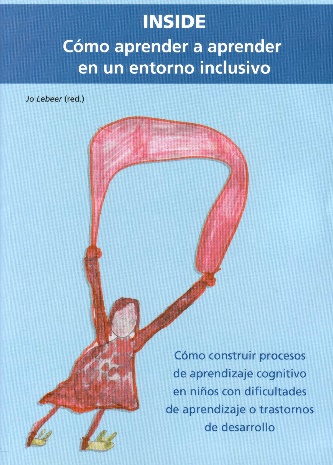
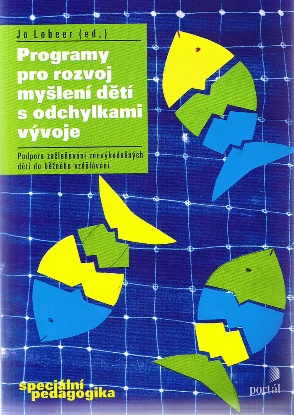

The INSIDE Teachers’ Guide has been translated to Dutch, Czech, Latvian, Spanish, Romanian and Hungarian
Sources of inspiration
The INSIDE project is inspired by three pre-existing approaches, each of which has pioneered (cognitive) learning enhancement and inclusion over the past decades. They rely on sound theoretical foundations as well as on scientific research; they were extensively tested and studied at universities. But what’s most important is that they provide tools to effect change.
 | Feuerstein’s Mediated Learning Experience Reuven Feuerstein (1921-2014) (International Centre for the Enhancement of Learning Potential, Jerusalem) has gained worldwide fame for his ideas and methods of mediation and learning enhancement. He argues that intelligence is not determined at birth or by any other circumstances, but that the cognitive building blocks of thinking are constructed through “mediated learning experience”, a quality of parent-child or teacher-child interaction. He developed three applied systems: (1) the Instrumental Enrichment Program (IVP), a program for learning to think, (2) the LPAD (Learning Potential Assessment Device), a dynamic way of looking at how someone learns and can learn, and ( 3) the concept of the Modifying Environments, ie making the people in the environment work together in such a way that the learning capacity is maximized . The mediation criteria offer handles to deal more consciously with one’s own attitude in promoting learning processes. |
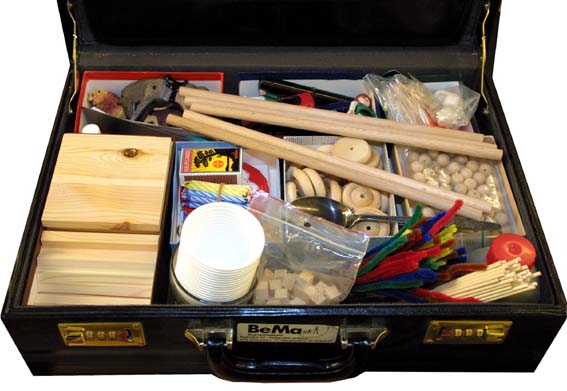 | Nyborg’s Concept Teaching Model Prof.Magne Nyborg (1929-1996), pedagogist, founded the Institutt for Anvendt Pedagogikk (Institute of Applied Pedagogy, Norway). He argues that the basic concepts (such as size, shape, number, position, time, etc.) are the prerequisites for effective learning in a school or any other social situation. Nyborg’s Concept Teaching Model systematically teaches basic cognitive concepts and conceptual systems to children from preschool age. This has enabled many children with a slight to severe disadvantage to participate in mainstream education |
 | Sue Buckley’s system of early language and reading promotion In 1980, Sue Buckley, professor of developmental psychology at the University of Portsmouth (UK) and foster mother of a daughter with Down syndrome, became fascinated by the story of a father of a girl with Down syndrome, who said he had taught his daughter to read when she was three years old. Buckley decided to do more research on this. It was the start of the Sarah Duffen Center for Developmental Disabilities (now DownsEd), a research, materials, training and consultation center. She teaches the systematic reading of global words at a young age (kindergarten). This has a positive effect on the language and cognitive development of children with Down syndrome and other developmental problems. Later on, other basic skills such as writing and arithmetic are also taught. Teachers are taught how to adapt their curricula to individual needs. It has enabled many children with developmental disabilities to participate in mainstream school. |
Objectives
Helping students, especially those at risk of early school leaving or learning difficulties, to better participate in mainstream education, by (1) activating their basic cognitive learning skills and (2) promoting the skills of teachers and other people in an educational context to work in an inclusive and learning-promoting way. More specific objectives = developing and testing course modules and materials that have the aim:
- develop the basic conditions of “learning how to learn” in all learners
- prevent school failure in people with learning disabilities (in all degrees of severity)
- activate cognitive development, i.e. basic skills for learning, studying, language and social skills
- improve opportunities for inclusive education
- make teachers more flexible to differentiate learning content according to the diverse needs of students and develop a more process-oriented teaching style
Partners
Norway
Institute for Applied Pedagogy Inst. for Applied Pedagogy,
INAP-Pedverket
Uttrågata 12, Postboks 115, N-5701 Voss,
Contact person: Gunvor Sønnesyn
Belgium
Universiteit Antwerpen
Project of Learning Enhancement & Inclusion
Universiteitsplein 1, 2610 Wilrijk
Contact person: J. Lebeer
United Kingdom
DownsEd, Down Syndrome Educational Trust,
Kirkby Lonsdale, Cumbria,
Contact Person: Frank Buckley
Romania
University of Babes Bolyai Dept. of Psychology and Educational Sciences
Str.Kogalniceanu 1-3 3400 Cluj-Napoca,
Contact Person: Enikö Batiz, director of Dept Applied Psychology (formerly Maria Roth and Istvan Szamoskozi
